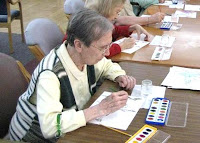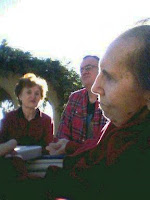bereave: O.E. bereafian "to deprive of, take away, seize, rob," from be + reafian "rob, plunder," from P.Gmc. *raubojanan, from PIE *reup-, *reub- "to snatch." A common Germanic formation (cf. Du. berooven, Ger. berauben, Goth. biraubon). Since mid-17c., mostly in reference to life, hope, loved ones, and other immaterial possessions. Past tense forms bereaved and bereft have co-existed since 14c., now slightly differentiated in meaning, the former applied to loss of loved ones, the latter to circumstances.Crippled Wolf continues to be confounded by his mother Senior Witch’s death in January.
In the 2006 movie Eight Below, a team of husky and malamute sled dogs take care of each other and survive for six months in Antarctica after a severe storm forces their human companions to abandon them.
 The part of the story which resonates most for Crippled Wolf comes when Dewey, one of the huskies, falls off a steep slope and is fatally injured. The other dogs stay to comfort their teammate until he dies, but then they move on—except for the youngest dog, Max. Max, seeming not to understand what has happened, stays beside Dewey’s body for a day or so longer before following the others.
The part of the story which resonates most for Crippled Wolf comes when Dewey, one of the huskies, falls off a steep slope and is fatally injured. The other dogs stay to comfort their teammate until he dies, but then they move on—except for the youngest dog, Max. Max, seeming not to understand what has happened, stays beside Dewey’s body for a day or so longer before following the others.Crippled Wolf sees himself in Max. Rationally he understands what death is, yet that deeper animal part of him continues not to understand.
How can a person simply stop being?
He keeps going back to that bed with the curtains drawn around it and sitting next to the body, just as he did repeatedly on the night his mother died. Looking at the still face, touching the hands. Unable to reconcile memory of her with physical reality.
He keeps going back to earlier moments when, directly or indirectly, he and his mother acknowledged that she was dying.
There was the Sunday night in March of 2007, when he and she agreed that she needed to leave her home of forty years to live with his sister. Crippled Wolf is startled, as he rereads the story, to discover how much he knew when he told it that he didn't know he knew. But, then, that is part of the blessèd mystery of storytelling.
One passage which stands out now:
In one of her earlier heart-to-hearts with her Mom, Senior Witch, [Walhydra] had steeled herself to say something out loud, allowing her sobs to come as she spoke.
"I've realized a way I've been fooling myself for the past few years. I've been pretending that if I just did a good enough job of managing things and providing for you, you wouldn't grow older and die."
Her mother hugged her, and they were quiet together for a while.
Then Senior Witch said, "I've realized something, too. I've realized that for years I've been telling myself that I was going to die perfectly healthy. Isn't that silly?"
They both laughed.
 And another passage:
And another passage:"Do you remember," Walhydra asked, "back in September, when we went to rent a DVD that last night? You picked Iris, about Iris Murdoch's decent into Alzheimer's.Three months later, Crippled Wolf was trying to comfort his mother through her homesickness. A year after that, once Senior Witch moved to assisted living in his own town, Crippled Wolf began taking her to Lutheran church services, so that she would feel more at home. He was bemused by their contrasting experiences of the same "structured worship.” Nonetheless, introspective awareness was something they could still talk about.
"And I kept wondering, all through the movie, 'Does Mom know this is what's happening to her? Is she trying to tell me something?' "
Senior Witch did her own Mona Lisa smile.
"I knew. And, no, I wasn't trying to tell you anything."
 By fall of 2009, though, "bemusement" was rarely the word that came to mind. Senior Witch was falling repeatedly, yet she could not remember the falls or perceive how completely she had lost the capacity for self-care. At the same time, Crippled Wolf's father, the retired Lutheran pastor, was rapidly losing independence to Parkinson's disease.
By fall of 2009, though, "bemusement" was rarely the word that came to mind. Senior Witch was falling repeatedly, yet she could not remember the falls or perceive how completely she had lost the capacity for self-care. At the same time, Crippled Wolf's father, the retired Lutheran pastor, was rapidly losing independence to Parkinson's disease. "Mortality" was now quite decisively the word.
"Mortality" was now quite decisively the word.A brief passage from "The Dark, again," written after Senior Witch was hospitalized by a fall, sums it up:
The veil between the living and the dead is our own bodies. They are always thin, and they grow thinner by the moment.More specifically, with regard to caretaking for Crippled Wolf's mother, the fact was that
Senior Witch has clearly moved into the childlike phase of Alzheimer's.And here is where Crippled Wolf wonders if he made a mistake.
She still remembers people. She is still that sweet person who charms everyone she meets. She still sometimes summons the mental focus for brilliant conversation.
Usually, though, she takes a child's approach, making up explanations and excuses for troubling things that happen…including that fall. And she rewrites her own history, free-associating different real and imagined details to account for events…including that fall.
She is unlearning. The likelihood of teaching her new safety steps is questionable.
Not in the practical choices, as painful as some of them were. Senior Witch had to move into skilled nursing care—against her will but for her own safety. After a series of systemic infections and an increase in combative and escape-seeking behavior, she had to move to a different, secured nursing facility. The staff were gentle and loving, yet Senior witch resented being confined to a wheelchair as a "fall risk," no longer allowed her favorite activity of walking and wandering and visiting without accompaniment.
Crippled Wolf does not regret those choices, made out of what he came to call “compassionate ruthlessness,” the sort of choices a good parent makes for his child’s wellbeing, regardless of her own wishes.
What Crippled Wolf wonders is if he gave up on seeking introspective sharing with Senior Witch too soon. He knows he was afraid of asking her directly how she perceived and understood her own dying.
He circled round the topic one time in the first month after he moved her into skilled nursing care. They were sitting on a tree-shaded deck, watching Chinese geese in the large pond behind the facility.
“I’m remembering…,” he begins. “I’m remembering when you used to have long distance calls with your mother during her last years.”Crippled Wolf regrets that he didn't ask outright while she could still answer. Perhaps they didn't need "the death conversation," since they had spoken so much to each other about faith and doubt, so deeply and so frankly, for so many years. Yet he wishes he knew....
“Yes,” Mom says, brightening a bit. “We used to talk on Sunday afternoons.”
“Yes, I remember.”
They sit.
She notices a spent yellow balloon, caught in the low branches over the pond.
“Grandma didn’t like moving to nursing care, either,” Crippled Wolf ventures.
“No.”
“She was angry about it.”
“Yes.”
They sit.
They notice other things. All of this time, they have been holding hands.
They hold each other’s eyes for a long time.
She doesn’t nod, but something flickers in her eyes, as if she were nodding.
He suspects that sometimes his "Quaker silence" is actually a defense mechanism, a way to avoid having to talk with others about his most intimate doubts, his most self-contradictory notions and prejudices and fears.
During her last year, Senior Witch often could not find words for what she wanted to say. If she spoke spontaneously, she could voice a cogent sentence or two. However, if she stopped to think, or if someone else asked a question which called for pondering, she could no longer manage to express her inner awareness in language.
 Fortunately, over the years, she had attended Quaker worship often enough to be quite at home sitting with Crippled Wolf and Hubby Jim in gathered silence. Eventually, in fact, she chose Quaker worship over the Lutheran service, simply because the latter had become too difficult for her to follow. They would sit with her several times a week in the nursing facility's riverside garden, just holding hands and watching the light on the water.
Fortunately, over the years, she had attended Quaker worship often enough to be quite at home sitting with Crippled Wolf and Hubby Jim in gathered silence. Eventually, in fact, she chose Quaker worship over the Lutheran service, simply because the latter had become too difficult for her to follow. They would sit with her several times a week in the nursing facility's riverside garden, just holding hands and watching the light on the water.Crippled Wolf has been reading about the neurobiology of consciousness for about a decade now, so he knows from the research that the brain creates "self-awareness" through a complex, network of constantly shifting and interactive processes. He suspects that he watched this creative process in reverse with Senior Witch, as her Alzheimer's-afflicted brain became increasingly less able to sustain the whole assembly which constitutes conscious self.
He and Jim often noticed, when they arrived for a visit, that she would initially appear to be staring vacantly at something. When they spoke to her, she would gradually focus and recognize them with a beautiful smile. As the visit continued, whether or not they spoke much, her "self" would seem to reassemble, so that she gradually became more and more the person they knew and could interact with. Whatever her inner experience might have been, what they could see was that rising of "self" just enough to recognize and share presence with them.
Early the morning of Senior Witch's last Wednesday, Crippled Wolf awoke from a dream which he knew he needed to share with her. He went see her before work. She was in a recliner in the hall outside her room, lying in the morning sunlight. She smiled when she saw him.
"I dreamed this morning that we were at a party," he told her. "You and your three brothers and some other people were there. You were telling jokes, the center of attention, and everyone was laughing and cheerful."
Without a word, she nodded and smiled at him.
"Well, I have to go to work now," he said. "I love you."
She mouthed the words. "I love you."
Friday morning early, a nurse called to say that Senior Witch had been sick during the night. Crippled Wolf stopped at her room on the way to work.
At first she looked startled and distressed when she saw him. Then he held his left hand to the right side of her face. She closed her eyes and leaned against his hand.
That night, he and Jim watched as she gradually stopped breathing.
Crippled Wolf doesn't know if there is any continuity of the "self" after death. It's a familiar, traditional belief, yet he is not one of those people who—as the Quakers say—"knows this experimentally" (that is, experientially).
That, perhaps, is part of why he continues to be confounded, like the sled dog Max
She continues in memory, yet he doesn't know where she is.
 And so it is.
And so it is.Blessèd be.